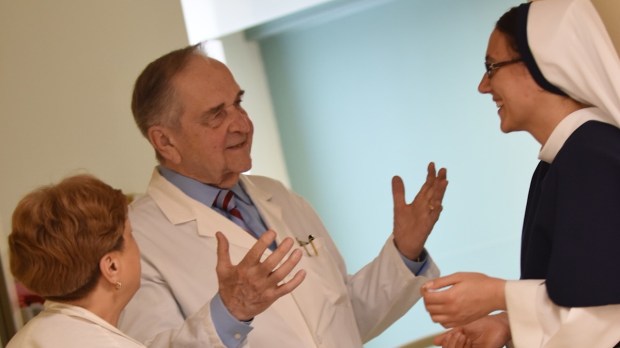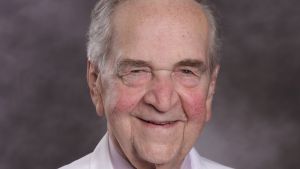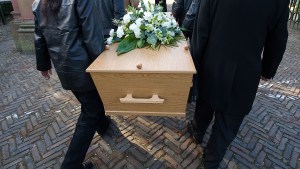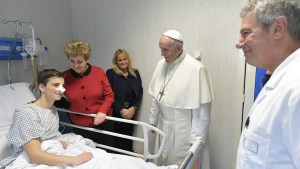Dr. Michael J. Brescia, who spent most of his 60+ years of medicine in what he called “the vestibule of heaven,” finally crossed the threshold of eternity on April 19 at the age of 90. We who remain on the other side will miss this great and holy man.
Although he will be unquestionably remembered as a legend in the medical field — from the millions of lives saved by his co-invention of the revolutionary Brescia-Cimino arterial fistula to his visionary, trailblazing efforts in the field of palliative and hospice care at Calvary Hospital in the Bronx — Dr. Brescia did not set his heart on the things of this world.
The welcome of the thousands of souls who were waiting in eternity for this selfless man who filled their final days on earth with dignity, care and love, treating each as if they were Jesus Himself, will be the only fitting tribute that could accord with his incredible life.
As we honor the memory of the great Dr. Michael J. Brescia, the following is a reprinting of an interview that he gave for the Sisters of Life Imprint magazine in 2017.
How did you get started in palliative care?
Dr. Brescia: I had no intentions of being in palliative care. I did the early work on organ transplant and dialysis. Before 1966, people with kidney failure could only live from three weeks to three months. Everyone was trying to find the method that would allow us to keep repeating the dialysis long-term until a suitable kidney became available.
I heard that you were responsible for a famous invention?
Dr. Brescia: I joined the VA hospital in the Bronx because they had a lot of soldiers coming back from Vietnam who were dying of kidney disease. One day I was feeling very desperate; I had about 10 men upstairs in the VA. These were all young folks, but they were all going to die.
I’m down in the lunch shop with my colleague, thinking about the problem. There are two french fries lined up side by side on my plate. I take a bite out of my hamburger and a blob of ketchup falls down perfectly in between the french fries. It was like Gabriel whispering in my ear. “Don’t move it! Don’t move it! Not yet! There’s the answer.”
I looked at my plate and I thought, “It’s like a vein and an artery in the wrist. I wonder … if I connect this vein and artery with a fistula, would this vein, and all the other veins, actually change and become like arteries? Then we wouldn’t just have one artery; we’d have 200 arteries! We could keep putting the people on the blood-cleansing machine indefinitely!” I ran upstairs and said, “We’re going to do a fistula.” Would you believe it – it worked! That was 50 years ago, and they are still using it.
Did you patent the invention?
Dr. Brescia: A drug company was very interested in it; they offered me $50 for every dialysis done worldwide. I thought, “I’m going to be rich!” But then I go and tell my father. He says: “I’m so proud of you, son. How many people in the world will be saved every year by your invention?” I said, “50,000 in America alone, worldwide even more.” My father said, “Well hurry up then, don’t waste a day!”
The drug company had told me I had to keep it secret for one year so they could prepare to open dialysis centers around the world at the same moment.
My father says, “No, no! If you do that, when you shave in the morning, your face will disappear in the mirror and the faces of all the children whose parents you could have saved will come and appear one after another. When you sit down at the dinner table, you will have to keep a chair empty for all the people who died that year because of your silence. Don’t think of this world – for boats, and cars, and houses, you will let 50,000 people die? No, give it away!”
I was mad at him, but I knew he was right. I left and published it immediately. Recently, they told me the value of the invention is now about $60 billion.
How did you become involved at Calvary Hospital?
Dr. Brescia: God sent me. A couple of my colleagues asked me, “Michael, could you help us out? There are some nuns in the South Bronx that need a doctor to visit their patients tomorrow.” So I said, “Ok, I’ll do you a favor.” The nuns gave me tea and cookies. At the end of the day, they said, “Oh, Dr. Brescia you were so helpful to our patients. Could you come back tomorrow?” I was on my way to the University of Pennsylvania to start a dialysis-transplant program. But I agreed to come back for just one more day.
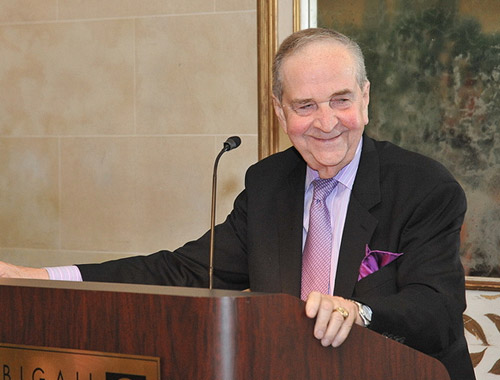
What made you stay longer?
Dr. Brescia: The nuns also took in children that no one wanted, and they put the kids up to hanging on my legs as I was leaving so I would come back the next day. I loved the kids. The Sisters would say, “Stay another month.” It got longer and longer … The nuns were running out of money.
Cardinal Spellman was helping out. I stole his coin collection. I’m serious! I went to see him, and he said to me, “You’re asking me for a quarter of a million dollars, Michael, where am I going to get that money? You tell me!”
I look up and behind his desk were all these gold coins. You’ve got to believe in Providence. So I said, “Well, I’ll take that coin collection. If we sell those, we’ll have the money with some to spare.” He looks and says, “I knew I should have taken them down. I heard about you!”
Well he does it. He sells the coin collection and gets $250,000 for Calvary. But then it appeared in the paper that he had to sell it, and a rich Catholic bought it back for him. So I got the money and he got to keep his coin collection. But after that he said, “Don’t visit for awhile!”
How did Calvary become a hospital?
Dr. Brescia: Unfortunately, the place was still going to close because there was not enough money. Calvary wasn’t classified as a hospital yet, so I said, “Let’s see if we can get approved.” So the Joint Commission comes in and a Dr. Kruger looks at the place and says, “You’re never going to pass. You’ve got too many serious deficiencies.” But as I was showing him around he says, “Dr. Brescia, you’ve got a very famous name in kidneys. Do you know him?” I said, “I do … I’m him!” He said, “Don’t lie! You’re not him. He’s in Pennsylvania!” I said, “No, he’s supposed to be in Pennsylvania, but he’s right here in the South Bronx.”
At the end of it, Dr. Kruger says, “You’ve got six months to get these things fixed, but in the interim we went from getting $12 a day per patient to $300 and Calvary was saved. God kept me here, and He sent Dr. Kruger. The money came in, and we were able to develop. Then Cardinal Cooke came and said, “If you stay, if you set your mind to it, I have five acres in the North Bronx that I’ll give to you to build a new Calvary.”
So now you had to make another decision?
Dr. Brescia: It was torture. My family was packing to go to Pennsylvania. By that time more people were learning how to do the fistula, and I was running out of time. But I put my eyes on heaven instead of earth. That’s how I wound up staying here. By 1970, I was devoted full-time to Calvary. By 1978, the new hospital building was constructed, and we moved here. It wasn’t really in my control, there was something else at work; it wasn’t me. We had to save Calvary. Now we are the only hospital of its kind in the world.
What makes Calvary Hospital so unique?
Dr. Brescia: We’re different; we’re mission driven, Gospel driven. At Calvary, we have never, ever, in any way, hastened death purposely. We’ll argue, “We love you enough to never kill.” We come across a symptom that is unacceptable, and we treat the symptom until there is relief. Our doctrine is succor, compassion, love, gentleness. I’m never going to tell someone they have to suffer. I will work to alleviate their pain.
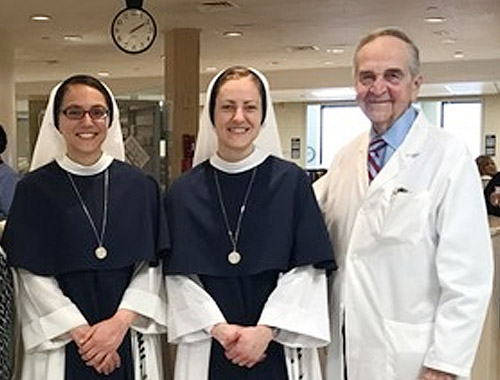
Why do you think people ask for physician-assisted suicide?
Dr. Brescia: It is because of suffering, depression, loneliness, physical symptoms, and personal image distortion. Sometimes people begin to feel guilty. They think, “Why should other people have to take care of me? Isn’t it better if I’m dead?” That’s the way the thinking starts. It is a hard thing when we have to depend on others to do very basic things for us.
As human beings, we suffer in three main ways: spiritually, mentally, and emotionally. Spiritual suffering has to do with the person in the bed saying, “Why did you do this to me, God? I don’t want to be here.” There is also fear: “Is there a God? Does He know what’s happening to me? Does He care?”
One part of mental suffering is depression. There is wonderful medication that we can use to treat depression.
But the main way we suffer is emotionally – the sense of abandonment, the absence of love. Emotional suffering can only be treated by love.
How do you help those who are suffering emotionally at Calvary?
Dr. Brescia: There are four ways. The first way is to be present. These patients can’t be alone. You have to try as much as possible for them to have contact, presence. The second way is touch. When we touch someone, we are no longer the same; there is a bond. Babies in their mother’s womb touch the uterine wall. We have to touch our patients. That’s the way to love anybody. The third way is to hold, to embrace someone so they know they are not alone. The fourth way is to say it, “I love you. I promise never to abandon you.” I have said it a 1,000 times a day. You have to be present, to touch, to hold, and you have to say it. Families need the same care as patients. About 80% of our day is spent with families. Be present, give information, touch them, hold them, and tell them that they are a gift to you; their loved one is a gift.
How have you seen the success of this approach?
Dr. Brescia: At Calvary, we treat 6,000 patients a year, and no one, after they have been here for 24 hours, asks for assisted suicide. No one: no matter what’s wrong, and we’ve seen some terrible cases. Not when you reach out with arms of love. When I enter a patient’s room, I always stop on the saddle of the door, and I pray, “My dear Lord God, my love for You brings me here for Your greater glory.” Then it is no longer a patient’s room; it’s now a sanctuary. When you ask God to come, He comes. I know He’s there. I can feel it. And when someone is dying, you think that room is part of this earth? No! You are not in this world. You have entered the vestibule of heaven.
Can you tell us about a time when you have experienced this?
Dr. Brescia: One day I was leaving for Washington, and I got a call from Metropolitan Hospital. They had a woman they had found under the highway. Could they send her right to Calvary? She had no family; she wasn’t speaking. She was filthy, and her name was Angela. So I said, “Ok, we’ll take her.” And as I was leaving, Angela was coming in; she had a big tumor coming out of her back. She had chopped red hair, no teeth. She had AIDS, hepatitis, and was draining all kinds of infected material. Of course, our cancer care technicians were anxious to go to work on her. I was in Washington for one day, fighting for funding. When I came back I went upstairs to see her, and I couldn’t believe what they’d done. They cleaned her out, worked on her mouth, did her hair, did her nails.
She didn’t look like she understood anything, but I said: “I’m going to promise you, Angela, that I will see you three times every day.” I thought, “Three times a day I’m going to come in and touch you and tell God, ‘I’m going there because of my love for You.’”
Six weeks later, I’m coming back from Washington again feeling discouraged. I think, “Oh I won’t go see her tonight; I’ll see her tomorrow.” Then I think, “No, I’d better go. I’ll feel miserable tonight if I don’t go.”
I go up to the floor, and Angela is dying. So I take off my coat, and I take her hand, put it on my cheek and I say, “Angela, I’m staying.” Exactly 90 minutes later, I hear, “Dr. Michael. Dr. Michael.” I couldn’t believe my ears. I jump up, and I’ve got her now as tightly as I can, and I say, “Angela?!” She said, “Dr. Michael, tonight, in a few hours, I’ll speak your name to God.” She never spoke another word. She closed her eyes and left this earth.
Having witnessed so many deaths, you must have some insight on the experience of grief?
Dr. Brescia: Grief is that last way that people suffer. I was married for 53 years. Beautiful, wonderful wife, perfect partner, six kids. We’re going out to a special dinner, her and I, and I’m going to tell her I love her. I’m waiting in the family room, “Come on Monica, let’s go.” And she steps out of the bathroom and falls down on the ground. Ruptured aneurism in the brain. The way she went down I knew. I knew. I said, “Monica, don’t go. Take me with you. Please, don’t leave me here. Don’t go.” She left. She was gone in 10 seconds. Now that’s grief.
Grief is brutal. Grief stays. It modifies, but it doesn’t go away. From the time it happened to now it’s different. But anytime anything happens in our family, I hear a knock at the door. It’s a man in a black suit, and he says, “Hello, I’m Grief. I was in the neighborhood. I saw you laughing, smiling with your children. I just want to let you know I’m around.”
We all went through a terrible time. But you have to come to terms. “I am the Resurrection and the Life.” That’s it. You either accept that or not. I know Monica is in heaven. I know that. Someday the curtain will open, and she’ll be there with some of my favorite patients, and she’ll say, “It’s time.” I told Monica, “I’ll never forget a hair on your head.” And I haven’t.
What do you think helps people when they are grieving?
Dr. Brescia: Same thing: love. You have to be there. They can’t be alone. They have to be touched, held. This is the depth of what is required. This is how we show love. This is how we deal with assisted suicide too. Emotional suffering requires not sympathy, not empathy – love.
What do you think about the current acceptance of assisted suicide?
Dr. Brescia: I don’t think we as a society, as a nation, can survive all this killing. You talk about the culture of death; assisted suicide is a slippery slope where it becomes easier and easier to kill. There are plenty of examples where we can cure people who are suffering from diseases that used to be fatal. A few years ago, we found out that using five drugs together could completely restore AIDS victims. You could be on the verge of death one day and then a week later you’re on your way to getting treatment.
Have you ever found suffering that you couldn’t alleviate?
Dr. Brescia: At Calvary, we have found that absolutely any pain and any symptom can be alleviated. There has never been a time when I said, “I’ve got to go home and leave this person suffering because I don’t know what to do.” I couldn’t go home. I’d have to stay until I got rid of the pain. You can’t allow someone to lay there in agony.
In the Bible it says, “Let us make man in our image and likeness.” Are you saying dear God, Lord of the Universe, that I look like You? Yes! This isn’t fake. When you go into a patient’s room, you find an image of Christ. I tell my staff to be redeemers. “You want to take Jesus off the Cross? Now is your chance. Take Him off.” That’s why I never get burned out. I believe we are all redeemers. We are part of Christ’s redemptive mission. We make up for the misery of the world. Every time I go into a room, and I come out, I’m different. I made a difference in this world, to this person.
Originally printed in the Winter 2017 issue of Imprint.
Aleteia thanks the Sisters of Life for this article. The Article text found here: https://sistersoflife.org/2019/08/27/hello-world-3-3-2-2/
